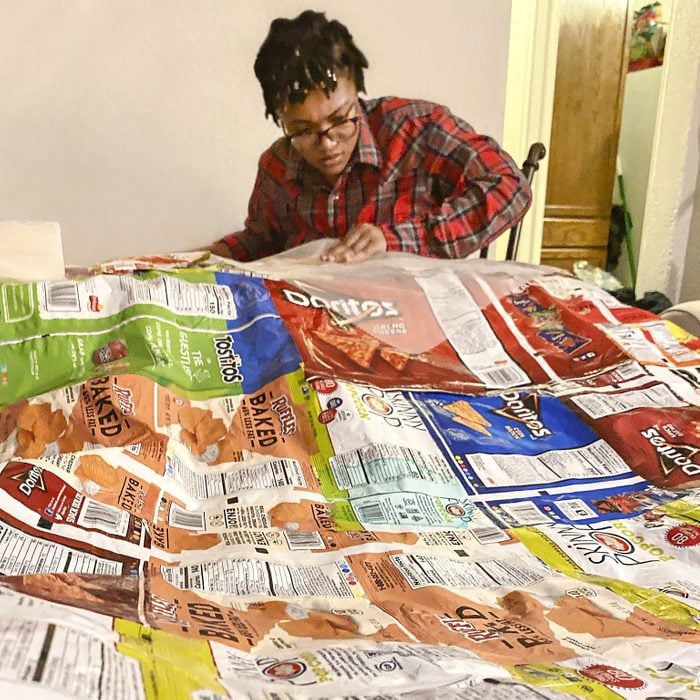Meet the Woman Who Turns Chip Bags Into Sleeping Bags for the Homeless
Updated: Feb. 15, 2023

How one environmental justice advocate is helping the most vulnerable while also diverting trash from landfills
In late 2020, Detroit resident Eradajere Oleita stumbled across a video on Facebook that explained how to make sleeping bags from used potato chip and other snack bags. The then-24-year-old knew she had to do something with that information—it was a classic “two birds with one stone” solution. She could help the city’s homeless folks find warmth during Detroit’s notoriously cold winters while also giving a second life to chip bags, which aren’t easily recyclable and usually end up in the trash.
On Dec. 15, 2020, Oleita posted a straightforward request on Instagram: “The cold weather is upon us and will only be getting worse. I am wanting to collect 10,000 chip bags to make 60 sleeping bags or money to go towards the purchase of sleeping bags. These sleeping bags will be distributed all over Detroit (to [vulnerable] homeless ppl on the streets).”
And with that, the Chip Bag Project was born.
This concept of upcycling used goods isn’t new (even if the term may be). People have been imagining ways to reuse household items for generations, and you’ve likely done it yourself. Ever turn an old T-shirt into a pillowcase? You’ve upcycled clothes. Heard of the man turning old jeans into denim sunglasses? That’s upcycling too!
Finding new uses for existing items is a great way to help fight our growing trash problem and practice sustainable living. Consider this: Here in the United States, we throw away 4.9 pounds of trash per person per day. In 1960, that figure was just 2.68 pounds per person per day. It’s nearly impossible to overstate how important it is to reduce the amount of trash we send to landfills. And as Oleita’s Chip Bag Project proves, upcycling versus recycling does more than help us use less stuff—it helps us support our communities too.
Helping people and the planet
For the Nigerian-born Detroiter—Oleita moved to the United States in high school—and lifelong environmental and social justice activist, the Chip Bag Project is a way to help clean up the city’s streets, reduce waste and keep trash out of landfills, and support folks in need.
“We’re all humans who share this planet together, and it’s my obligation to make sure the person next to me has access to basic necessities,” says Oleita. “We have a major climate issue happening, and the people who are most impacted are those who are economically impoverished.”
Working with discarded chip bags was not only logical but also practical. They’re recyclable only at specialty facilities, meaning a tiny, tiny portion is actually recycled. But they’re also great insulators that, when upcycled, become waterproof, lightweight and portable sleeping bags that help folks stay warm.
No longer a one-woman operation
Almost immediately after Oleita posted that first call for bags, people took notice. Local businesses enlisted to serve as collection points, and volunteers raised their hands to get involved.
For most of the Chip Bag Project’s existence, Oleita manufactured sleeping bags all by herself. Now, she has some help. The group operates with a core team of 10 volunteers who do everything from making and delivering the bags to sourcing financial sponsors and doing community outreach. “We’re a community initiative, so it’s important to make sure that we’re keeping our ears to the ground as we grow,” Oleita says.
From snack bags to sleeping bags
A lot needs to happen before an empty bag of Doritos can become part of a warming blanket. First, Oleita cuts open each bag, revealing the interior foil lining, and lets them soak in hot, soapy water for 24 hours. Once they’ve air-dried, they’re ready for assembly, which involves laying them in a line (kind of like a quilt) and ironing them so the plastics in the bags melt and fuse together. For added comfort and insulation, she lines the sleeping bags with old jackets and blankets that the group has collected, and she uses discarded vinyl and thicker plastic to fuse with the chip bags to make the final product more sturdy.
It takes about 14 hours to make a sleeping bag, and each uses around 150 to 300 chip bags, depending on whether they’re single servings or family size. Once a batch of sleeping bags is complete, volunteers from the Chip Bag Project distribute them to anyone on the streets of Detroit who needs one.
Growing pains and gains
The road to success has its ups and downs, and Oleita is intimately familiar with each. For a while, the Chip Bag Project operated out of a small space donated by a local business, but the team recently had to leave. “It’s ironic that we provide resources for displaced people and are now displaced,” says Oleita. “Not having a permanent place is a huge burden and source of anxiety.”
Yet they’re not giving up. Instead, the team does everything—including production, back-end business tasks and equipment and supply storage—in volunteers’ homes, the occasional church basement or community spaces they can use for an afternoon or weekend.
It’s hard work, but it has already paid off in one major win: The Chip Bag Project recently partnered with Cape Cod Chips. The snack food company sends Oleita its “reject” chip bags—those that were misprinted or cut off-center—in large rolls (meaning they haven’t been cut to snack-sized bags yet). It was a total game changer, reducing the manufacturing time for a single sleeping bag to just under two hours. “We made 20 sleeping bags in a two-day period,” recalls Oleita. “I cried [happy tears] after because it was so crazy.”
In an ideal world, Oleita would have more partners of this type—or, even better, a partner that would also serve as a financial sponsor and mentor of sorts. “This was supposed to be a three-month project for my birthday. We’re going on three years now. In order for us to keep going and to expand, we need more money,” she explains. “And it would be a dream to have someone give us tutelage, help us grow and teach us how to think.”
There’s definitely a desire and demand for the program. People are happy to collect their snack bags, and the housing crisis in the United States isn’t going away anytime soon. But there’s only so much a group can do, especially without a permanent HQ. (For context: One roll of Cape Cod Chips bags weighs about 10,000 pounds. That’s a lot of stuff to keep moving around.)
For now, the Chip Bag Project has had to limit its collection to school cafeterias because there just aren’t enough resources to process all the bags it would receive via other donations. Plus, Oleita has bigger goals for the future than only making sleeping bags.
Thinking big
Oleita has served as a community organizer for the past decade, and she has experienced homelessness herself. So she knew that this project needed to do more than just hand out sleeping bags. “I don’t make economic change by giving people a sleeping bag,” she says. “This [also] isn’t just about trash. That’s a passive approach. I’m asking, How do we bring individuals into the fold without putting blame on them? Where can we find equitable solutions that consider everyone’s well-being and human rights?”
Reusing stuff is not a new concept, especially to those without a lot of funds. “Poor people have always been saving and reusing—using old butter containers for food storage or McDonald’s cups as drinking cups long after the soft drink is gone,” explains Oleita, who speaks from experience. “We’ve always had this upcycling mindset. Now it’s time to monetize it, make a business out of it.”
To that end, the 26-year-old is working on growing the Chip Bag Project into an organization that also creates green jobs, helps vulnerable community members find resources and continues to raise awareness of and fight back against environmental racism.
She’s even created a name for this new venture: Chippin In. The goal is to support and empower people who are displaced, are nomadic or were formerly incarcerated. She wants to make a “transitional space” where these folks can learn job skills—while working to make sleeping bags and contributing to other areas of the Chip Project—and have access to health, mental health and other services. “Our mission is not to solve homelessness,” she says. “Our mission is to create economic opportunity through economic solutions. Chip Bag Project will be the collection and outreach portion of the business, and Chippin In is the workforce.”
Cross-country chip bag projects
Oleita is already making strides toward making a difference. In 2021, the project’s first full year in existence, the organization saved 2.5 million pounds of foil (1.5 million bags) from landfills and created 100 sleeping bags. The Chip Bag Project is expanding beyond sleeping bags to wearable, functional creations like jackets, and it has incorporated other types of foil-lined bags, such as pet food and candy bags, into its manufacturing process. It also began selling cute, reusable tote bags to raise funds.
Oleita would love to eventually have off-shoots all over the country. “I can die any moment, and if something is going to live and make impactful change, it has to live outside of me,” she says.
Her dream isn’t far off. As word has spread about the project, people in places like San Francisco, New York and Washington, D.C., have reached out to find out how they could do the same thing in their cities.
“This isn’t just a trash issue; it’s also a climate issue. And it’s not just a climate issue, but a human issue too. And it’s not just human, but a space and waste issue as well. Not just waste, but art,” explains Oleita. “I’m always thinking of the world as interconnected—energy is neither created nor destroyed, only transferred.”
It’s safe to say that that mindset is clearly visible in all her work.
Additional reporting by Andy Simmons.
Source:
- Eradajere Oleita, founder of The Chip Bag Project



